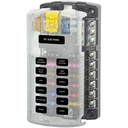fuse block 12 Circuits 5026
A fuse block is a component that holds and protects multiple electrical circuits. It houses a series of fuse holders, each designed to accommodate a specific type and amperage of fuse. Key Functions: Circuit Protection: Prevents damage to electrical components by interrupting the current flow when there's an overload or short circuit. Organization: Provides a centralized location for fuses, making it easier to identify and replace blown fuses. Power Distribution: Allows for efficient distribution of electrical power to various components in a system. Types of Fuse Blocks: Blade-type fuse blocks: Commonly used in automotive applications, they accommodate ATO/ATC fuses. Mini blade fuse blocks: Smaller versions of blade-type blocks, often used in newer vehicles. Low-profile fuse blocks: Designed for space-constrained environments. Glass tube fuse blocks: Used for larger amperage applications, typically in marine or industrial settings. ANL fuse blocks: High-current fuse blocks often used in audio systems. Common Applications: Automotive: Protecting the electrical system of cars, trucks, and motorcycles. Marine: Protecting electrical components on boats and watercraft. RV and campers: Protecting electrical systems in recreational vehicles. Industrial equipment: Protecting electrical components in machinery and equipment.





